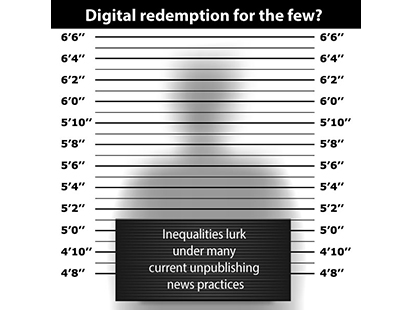
Good intentions for unpublishing may create unintended inequities
If you are working in a newsroom, you probably already know the challenges surrounding low-level crime reporting today. Crime briefs and the publication of mugshots drive a substantial number of unpublishing requests by individuals looking to shield these digital reminders of their past, often about old arrests or convictions.
This has caused at least one journalist so much distress that he walked away from his job, and we’ve seen that non-journalistic mugshot websites put First Amendment protections for journalists in danger.
Some newsrooms have decided to get rid of mugshots after a certain period of time (often called “sunsetting”) in an effort to split the difference between reporting the news and minimizing harm to the individual. Others have begun limiting their use of mugshots or eliminated them altogether—a difficult move when revenue is tight and mugshots are popular. After all, mugshot galleries make money.
For now, my project isn’t about tackling the more common questions of what or when to unpublish. Instead, there is a real need to consider who. Starting with who may ultimately help address some of the answers to the aforementioned questions of What and When.
Many people—including myself—have shared some version of the following hypothetical about unpublishing:
Back in [insert hypothetical date years ago], a frat boy got in trouble for streaking across his college football field during a game. The student paper identified him. Now he’s trying to get into law school, and he has asked that the article be taken down.
There are many layers of privileged thinking and assumptions related to the Who in that example. Consider these two questions that illustrate additional hurdles of Who that we must resolve before we can realistically expect to create effective—and equitable—newsroom policy:
Who has the knowledge, connections and persuasive prowess to contact a news organization and get something unpublished?
The right answer? Not everyone by a long shot. Does an upper-middle class white person with connections or someone with the resources to hire an attorney have a better chance of success when they contact a newsroom? This doesn’t imply a conscious bias when newsrooms decide whether to grant a request; it can simply be a numbers game. Others may encounter language barriers, lack technological understanding or access, or not possess the agency to even know how to contact your newsroom. Beyond not knowing how to ask, they may not even realize that they can.
You can see how the potential for inequitable unpublishing is likely inevitable for those newsrooms that choose to unpublish on a case-by-case basis—and based on research (including my own), that is most of them.
How will news organizations ensure inequities aren’t rampant as a consequence of new laws?
An example is the hundreds of thousands of expungements of marijuana convictions in dozens of states like New York. Is your newsroom prepared to handle this kind of change? If you unpublish for one person, will you do so for everyone who was arrested for the same crime? Or only those who contact you? What about those who don’t contact you? Are they denied the same courtesy because they didn’t know they could ask? And of course, it takes time and resources, which often a news organization doesn’t have, to come up with and implement any type of broad solution.
As part of this fellowship project, I will help partnering newsrooms explore how inequities that may be inherent in the reporting of crime may be exacerbated by which of those reports are ultimately unpublished. We will begin that work by considering how to combat the unpublishing challenge for past crime reporting, especially for those cases that have been expunged. More on that in the coming months!
Next month, I’ll officially announce the members of the unpublishing advisory committee and our newsroom partners where this project’s difficult work will take place. As those newsrooms identify their largest pain points related to unpublishing, we’ll work together to develop tools and create a guide that helps (hopefully) all newsrooms. After these resources are implemented and refined, they will be made available to everyone online.
Have suggestions about the unpublishing project? I’d love to hear from you.
Learn more about the unpublishing project and follow @unpubthenews on Twitter
